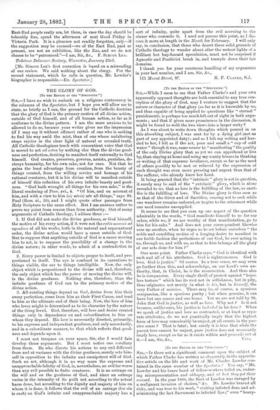[To THE EDITOR OF THE " SPECTATOR.1
SIR,—While I seem to see that Father Clarke's and your own apparently opposed thoughts are both essential to any true con- ception of the glory of God, may I venture to suggest that the nature or character of that glory (so far as it is knowable by us, and thus capable of being applied to questions like " eternal " punishment), is perhaps too much left out of sight in both argu- ments; and that if given more prominence in the discussion, it might be found to weld the two views into a larger unity ?
As I was about to write down thoughts which poured in on this absorbing subject, I was sent for by a dying girl (not as part of any appointed duty); and as I left my writing and hur- ried to her, I felt as if the act, poor and small a" cup of cold water" though it was, came nearer to " manifesting " the quality of the only Divine glory that as yet we can apprehend or live by, than staying at home and using my scanty leisure in thinking or writing of that supreme loveliness, except so far as the need of others possibly to be met or relieved by the expression of such thought was even more pressing and urgent than that of the sufferer, who already knew her Lord.
It being granted that the " intrinsic " glory is not in question, it surely may be said of the "extrinsic" glory, which is alone revealed to us, that as love is the fulfilling of the law, so sacri- fice is the fulfilling of love. The Divine glory is thus seen as as that of the Giver and of Sacrifice, ceasing not to seek while one wanderer remains unfound, or to give to the uttermost while one need remains misapplied.
It seems to me that you sum up one aspect of the question admirably in the words, " God manifests himself to us for our sakes, while we, if we are worthy of that manifestation, go to him for his sake." And does not your correspondent likewise sum up another, when he urges us to set before ourselves " the noble and ennobling motive of a longing desire to manifest in our feeble fashion the perfections of our God, he ever acting in us, through us, and with us, so that to him belongs all the glory of our acts done for him P"
One more point. Father Clarke says," God is identical with each and all of his attributes. God is righteousness. God is love. God is justice." Of course. Iu a true sense, we may even go further than this, and acknowledge, on our Lord's own au- thority, that, in Christ, he is the resurrection. And thus also be is compassion. Every single thrill of protest against "hope- less torture" which has its root not in selfishness, but in pity, thus originates not merely in what is his, but in himself, the very Father of mercies. There may be, of course, a spurious compassion, like a spurious purity ; but when genuine, it can have but one source and one home. Yet we are not told by St. John that God is justice, as well as love. Why not ? Is it not because, unlike ours, his justice is included in his love ? When we speak of justice and love as contrasted, or at least as sepa- rate attributes, do we not practically imply that the highest form of love may conceivably be unjust, at all events in the pas- sive sense ? That is fatal; but surely it is true that while the purest love cannot be unjust, pure justice does not necessarily imply love, except so far as it exists within and proceeds out of






































 Previous page
Previous page